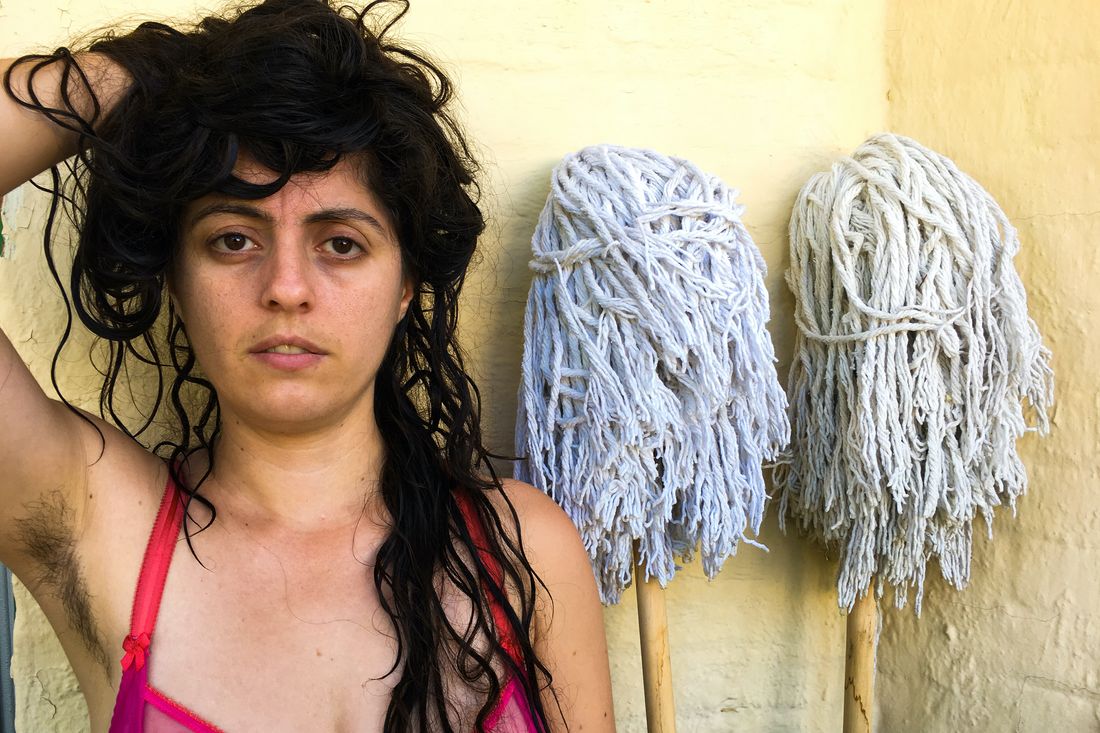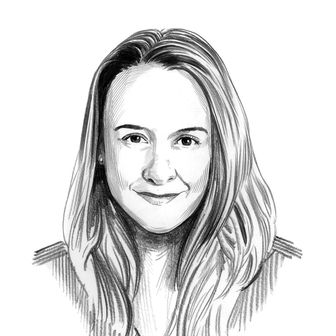
Midway into the narrative podcast Appearances come three of the most compelling minutes of audio I’ve ever heard. As the series’ protagonist, Melanie, awaits the results of a pregnancy test, we listen to her internal monologue. “Every morning, I wake up, and in my journal I write the words I am alone,” she tells us. She meditates on how much pee can drip out of you if you sit on the toilet long enough. Seconds tick by; suspense builds; pee drips audibly. I listened, rapt, as I watered a friend’s plants. My body was sweeping up dead fern leaves, but my mind was entirely in Melanie’s bathroom. It was the first time I had ever felt as transported by audio as I have been by reading — felt almost inside another person’s consciousness. “Okay,” Melanie finally whispers, picking up the stick. “Not pregnant.”
It didn’t occur to me to wonder whether those three minutes had really happened, but that’s the question undergirding Appearances, a sweeping, metafictional podcast based on the life of its creator, Sharon Mashihi. Mashihi plays the 35-year-old Melanie Barzadeh as well as Melanie’s mother, Vida; her brother, Bobbak; her father, Jamsheed; and her nosy neighbor, Faribah — all of whom live in a tight-knit community of Jewish Iranian immigrants in Great Neck. We barely hear anyone else’s voice on the podcast except that of Melanie’s 55-year-old ex-boyfriend, Ponch, who is played by Mashihi’s ex-boyfriend Thatcher Keats. Mashihi’s performances — as vulnerable, scathing Vida and dull, hidebound Bobbak — create characters who sound immediately distinct. The only ones whose voices are (intentionally) difficult to differentiate are Melanie and Sharon, who pops up as herself occasionally. “I will admit to you,” Mashihi says, self-mockingly, in the prologue to Appearances, “these voices are exactly the same.”
At the outset of the series, we learn that Melanie has decided to become a single mother using donor sperm, which she is almost sure will alienate her from her traditional family — especially her mother. Apart from Melanie, Vida is Appearances’ most vivid, sympathetic, and maddening character. She loves Melanie fiercely while refusing to accept almost anything about her. At its core, the show is about a mother and daughter who love but repeatedly damage each other. “That’s kind of the whole point of Appearances — to perform a version of my parents who suck in ways that my real parents may not actually suck,” Mashihi tells me on a recent frigid afternoon in Fort Greene Park. “Let me play them out sucking. Let me play them out wonderful. Let me say things I perceive that are not said.” In a flashback scene, Vida finds a condom in 15 year old Melanie’s bedroom and freaks out, even though it was given to her in health class. “Mom, I’m a good little Persian girl. I know to stick to blowjobs and anal,” Melanie says flippantly; Vida bursts into tears.
To the extent it’s possible to take the podcast world by storm, Appearances has — impressive considering it was independently produced and had no marketing budget. News of its existence has spread mostly via word of mouth among the audio cognoscenti. Lydia Polgreen, who runs Gimlet Media, heard about it from the documentarian Lynn Levy, who compared it to both Sheila Heti’s novel Motherhood and the TV series BoJack Horseman. “It feels like a creative breakthrough for the form,” says Polgreen. Radio plays are as old as radio itself, and Appearances’ docufiction style will be familiar to anyone who has read Karl Ove Knausgaard or watched Kirsten Johnson kill off her father in Dick Johnson Is Dead. Yet the intimacy of audio makes combining fiction and documentary seem new, particularly when it features a magnetic voice at its center. Is it possible to be an art-podcast star? Mashihi has a knack — apparent immediately in the tentative “Hi” that begins the show — for exploiting the intimacy of hearing someone whisper in your ear. The only thing separating her from auteurs like Phoebe Waller-Bridge and Michaela Coel may be the medium. Despite its current financial boom, podcasting is still a cultural niche without TV’s reach or literature’s prestige.
Mashihi is dressed too lightly on the day we meet, in a vintage red cloth coat. She has giant eyes and a thick rope of brown hair slung over one shoulder. I’ve spent so many hours listening to her anxieties about pregnancy that it seems natural the first thing we would talk about is her fertility. While Melanie eventually gets pregnant, Sharon is 37 and still figuring out how to have a baby. Her hormone levels, she says, are those of a woman ten years older. As we wait for cups of almond chai to be prepared, I try to reassure her with details from my own pregnancies. The tea is an excuse to take off our masks. When she sees the lower half of my face, she tells me my mouth is the kind she has always wanted, a compliment that sums up her entire vibe: self-effacing, weird, and unusually direct. As I check to make sure my phone is recording us properly, she says, half to herself, “Right, because this is the first question about the process.”
Mashihi describes herself not as an actor but as an “act-y person.” “I have three mediums: film, performance, and audio,” she says. “But audio is the medium I’ve been able to get paid work in, so it is the medium where my skill far surpasses my skill in the other mediums.” For a while, she took a class on Buddhism in theater, in which students would conjure their ancestors and enact scenes between them, mixing spiritual encounter with improv. She has worked in film production, collaborating with her friend Josephine Decker (Shirley). She spent several years working for NPR shows like Studio 360 and The New Yorker Radio Hour, building a reputation for extremely good craftsmanship. Even on repeat listens, it’s difficult to spot the seams in Appearances. Which conversations between Melanie and Ponch, for example, are taped real-life conversations between Keats and Mashihi, and which are reenactments or improvisations? Insincerity shows through more easily in audio than in film, explains Appearances editor and executive producer Kaitlin Prest, because there’s no way to distract the audience with stuff like costumes and sets. And if someone’s voice is insincere, she says, no one wants to listen.
Meeting Prest was a turning point in Mashihi’s career and her life. After becoming roommates eight years ago, they settled into an artistic collaboration–slash–best friendship. Both describe an early friend date as something out of an indie rom-com: “We went on a bike ride to the beach and made up names for each other,” says Prest. (They would later recount this scene on an episode of the Radiotopia podcast The Heart, in which they contemplate what it would mean to ruin their friendship through sex.) Prest and Mashihi soon forged a deal whereby they would trade off working on each other’s projects. When Mashihi started pitching what would become Appearances, Prest discouraged her from taking a deal with Luminary. The subscription-based company made them an offer for six episodes. It was “not bad,” says Prest, but it was one person’s salary.” She was also put off by the idea of the show’s being behind a paywall. “I imagined seven people listening to it and Sharon falling into a pit of depression,” Prest says. They ended up going with Prest’s own boutique production outfit, Mermaid Palace, which she founded after years creating Radiotopia and CBC shows.
For season two, Mashihi is eyeing a deal with a larger podcast company — mostly because she needs better health insurance to have a baby. While Melanie had success with her first IUI attempt, her creator is considering the much pricier prospect of IVF. Mashihi tells me that future seasons of Appearances will shift the focus from Vida to Jamsheed and eventually catch up with Melanie’s adventures as a single mother. If the timing works out, Mashihi will, ideally, be a single mother by then too. “I don’t know if she has any idea of what an endeavor child-rearing is,” says Keats, her ex. He points to Mashihi’s work ethic and her preference for being alone. “I think Sharon’s child will get recorded a lot, and there will be art made about the kid.” He compares her to the artist Sally Mann, whose photographs of her own children inspire awe and revulsion in almost equal measure for their unsparing intimacy.
If she had unlimited funds for season two, Mashihi says, she wouldn’t just make a podcast. She’d hire actors to play her family. “We’d live as a family in character, and there would be documentary cinematographers shooting us.” One of the main reasons she voices most of the characters herself is the impossibility of making actors do exactly what she wants. I mention there’s a more straightforward medium for manipulating reality without collaborators — the novel — but she’s not interested. “I want to micromanage my audience’s experience,” she says. “I can only do that by saying the words and choosing the right music and having more control over what their imagination is perceiving.”
On Appearances, she worries aloud about what performing her family could do to those relationships. The Mashihis haven’t listened to the podcast, and she has mixed feelings about whether she wants them to. “I wish my mom could listen and be like, ‘Wow. Our relationship is so complicated, but you’ve rendered what we have with such beauty.’ ” It’s unlikely to happen in reality, but that’s what art is for.
*A version of this article appears in the February 1, 2021, issue of New York Magazine. Subscribe Now!


